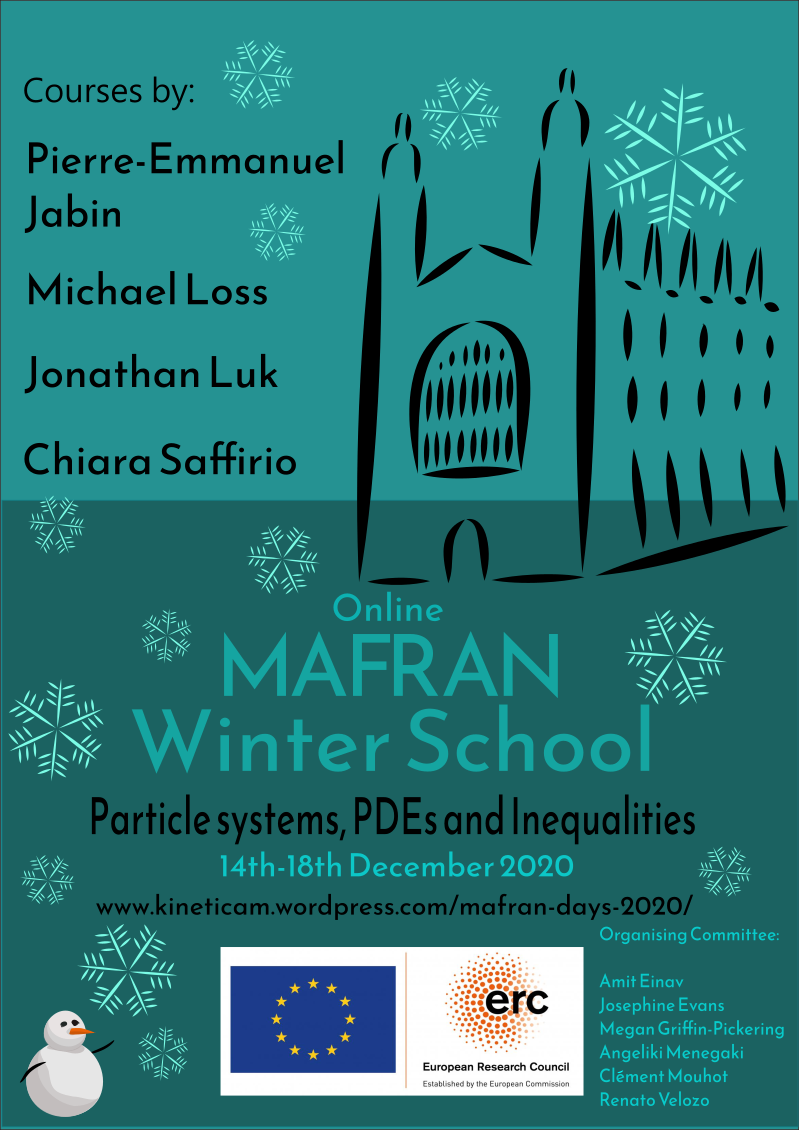Online MAFRAN Winter School: Particle systems, PDEs and Inequalities, 14-18 December 2020

The “Online MAFRAN Winter School: Particle systems, PDEs and Inequalities” is a five day school of mini courses and discussions on recent developments related to PDEs and mathematical physics. The online school gathers students and researchers worldwide, providing opportunities to discuss hot topics ranging from mean field limits in many particle systems, to high frequency weak limit and the impact of symmetry and its breaking in flows of elliptical PDEs.
Speakers
- Pierre-Emmanuel Jabin (Penn State University)
- Michael Loss (Georgia Institute of Technology)
- Jonathan Luk (Stanford University)
- Chiara Saffirio (University of Basel)
Mini-courses (Titles and abstracts)
- “An introduction to mean-field limits for many-particle systems” by Pierre-Emmanuel Jabin.
Abstract: I will present some of the main tools for the derivation of mean field equations from systems of many particles, either deterministic or stochastic. It is of course remarkable that the behavior of large systems of ODE’s or SDE’s actually becomes simpler at the macroscopic level as the number $N$ of particles goes to infinity. This phenomenon is of course connected to the so-called propagation of chaos which classically requires that the interaction kernel be essentially Lipschitz. Handling more singular interaction kernels is a longstanding and challenging question but which has had some recent successes that I will review as well.
- “Symmetry and symmetry breaking in functional inequalities” by Michael Loss.
Abstract: A functional that is invariant under a symmetry group has in general minimizers that are not invariant under the group. There are notable exceptions but it is often quite delicate to prove that the minimizers are indeed symmetric. We shall explore this issue in a number of examples such as the Sobolev inequality and the Caffarelli-Kohn Nirenberg inequalities. Applications to quantum mechanical systems with magnetic fields will be also discussed. Most of these results were obtained in collaboration with Jean Dolbeault and Maria Esteban. If time permits, some new results obtained in collaboration with Rupert Frank will be presented.
- “Burnett’s conjecture in general relativity” by Jonathan Luk.
Abstract: It is known in the physics literature that “high–frequency weak limits” of solutions to the Einstein vacuum equations are not necessarily vacuum solutions, but may have a non-trivial stress-energy-momentum tensor, which can be viewed physically as “effective matter fields” arising from back-reaction of high–frequency gravitational waves. Burnett conjectured nonetheless that any such limit is isometric to a solution to the Einstein-massless Vlasov system; and conversely that any solution to the Einstein-massless Vlasov system arises as such limit. In particular, if the conjecture is true, then a hyperbolic-kinetic coupled system arises in the limit as the effective equations starting from a hyperbolic system of equations. I will present some results on (both directions of) Burnett’s conjecture in the presence of a so-called $\mathbb U(1)$ symmetry, obtained jointly with Cécile Huneau.
- “From many-body Schrödinger dynamics to the Vlasov-Poisson system: mean-field and semiclassical regimes” by Chiara Saffirio.
Abstract: We will address the problem of deriving the Vlasov equation starting from a system of N interacting quantum particles in a mean-field and semiclassical regime. We will start by discussing the scalings, presenting the state of art and comparing it with the results known for the derivation of the Vlasov equation from N interacting classical particles. We will then focus on the semiclassical regime and present a new technique that allows to include in the analysis singular interactions (such as the Coulomb potential) and to obtain explicit bounds on the convergence rate.
Registration
Registration for this workshop is free but mandatory. We recommend that you use a university email address if possible. Link: https://forms.gle/EC1Wu27mTr2ao6P47.
Programme (in UK time)
| Monday | Tuesday | Wednesday | Thursday | Friday | |
| 1:50-2:00pm | Opening | ||||
| 2:00- 2:45pm | Chiara Saffirio | Chiara Saffirio | Pierre-Emmanuel Jabin | Pierre-Emmanuel Jabin | |
| 2:45-2:55pm | break | break | break | break | |
| 2:55-3:40pm | Chiara Saffirio | Chiara Saffirio | Pierre-Emmanuel Jabin | Pierre-Emmanuel Jabin | |
| 3:40-4:10pm | break | break | break | break | |
| 4:10-4:55pm | Jonathan Luk | Jonathan Luk | Michael Loss | Michael Loss | Round Table Session 4:00-6:00pm |
| 4:55-5:05pm | break | break | break | break | Round Table Session |
| 5:05-5:50pm | Jonathan Luk | Jonathan Luk | Michael Loss | Michael Loss | Round Table Session 4:00-6:00pm |
Queries?
If you have questions please contact Angeliki Menegaki or Renato Velozo Ruiz.
Organisers
Amit Einav, Josephine Evans, Megan Griffin-Pickering, Angeliki Menegaki, Clément Mouhot, Renato Velozo Ruiz.

This winter school is funded by the European Research Council (ERC) MAFRAN grant under the European Union’s Horizon 2020 research and innovation programme (grant agreement No 726386).
View information about MAFRAN Days 2019 here.
